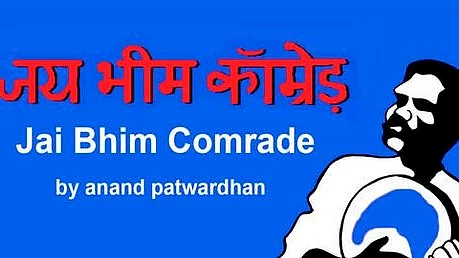In the past, filmmaker and radical activist, Anand Patwardhan, has given us ground-breaking films on some of society’s most relevant issues. The Indian state’s uncertainty towards his films was the biggest compliment to his work. The state tried to block these works of art every because they held a mirror to society, an image the state did not want to see.
Interestingly, Jai Bhim Comrade, is his first ever documentary that skated smoothly through the government channels and the Censor Board of India. It took Patwardhan 14 long years to complete the 200-minute-long documentary.
An Institutionalised Caste System
The film is a heart wrenching depiction of the caste-based butchery of Dalits in Ramabai Colony, Mumbai (Maharashtra). It provides a sneak peek into their state of affairs and the way in which the section of Dalits are still subjugated, oppressed and looked down upon in a democracy that boasts of its egalitarianism and classlessness
Data from the National Crime Records Bureau shows that the number of atrocities against members of the Scheduled Castes rose from 39,408 in 2013 to a record 72,000 by 2015. However, these numbers do not reflect the more sinister forms of bigotry that dictates the society.
Also Read: Marching With the Bhim Army
‘Jai Bhim Comrade’
In the wake up to the frequent incidents of injustices on Dalit scholars from across India and the death anniversary of Rohith Vemula’s suicide which was observed on 19 January this year, the film helps to comprehend the way caste atrocities are still entrenched in the social system we live in.
What the film further helps to understand is how these subtle atrocities have become institutionalised.
Patwardhan’s film begins with Vilas Ghogare singing a poignant ballad with his choir. The revolutionary singer anchors the representation of the predicament of Dalits of Ramabai Colony in the 200 minute-long documentary.
Ghogare is representative of the Maharashtrian Dalits, who are well-known for their exclusive democratic rebellion with their stirring music,
The very next shot shows him dead, having hanged himself in protest against the police at Ramabai Nagar which killed 10 innocent Dalits who were protesting in peace after a statue of Dr B R Ambedkar was desecrated with a garland of shoes.
During a protest over the issue, a police van opened fire, killing 10 unarmed protesters and leaving several injured.
The act of desecration of Ambedkar’s statue and the way in which the police under the Shiv Sena-BJP regime killed irreproachable Dalits motivated many Dalits to righteous resentment.
Through his honest lyrics and riveting singing, Vilas compelled many to rise against discrimination against the Dalit community.
Having worked with the bard, Vilas’s death encouraged Patwardhan to give a voice to the hundreds of Dalits who had been unheard for decades in India.
A Pan-Indian Theme
The scope of the film is not limited to Maharashtra. The film also highlights previous and long forgotten incidents of crime against Dalits.
It touched upon the killing of a Dalit revolutionary, Bhagwat Jadhav, by the Shiv Sena in a protest march in 1974 and the Khairlanji Massacre – where a Dalit family was ruthlessly murdered and women of the family were sexually abused and paraded naked by members of the politically dominant Kunbi Maratha caste.
When asked about the Khairlanji murder, one Maratha manoos defended it saying that the girl’s character was questionable and that the village had decided to teach her a lesson.
The film is replete with thoughtful shots conceptualised by Patwardhan, one such shot being the garbage sequence a chocolate wrapper in a heap of garbage when a Dalit sweeper is talking about the lack of basic amenities and his struggle to make ends meet.
Poetry of the Subordinated
Apart from these instances, the film also reflects upon the way the Indian Constitution is misrepresented by the hegemonic powers - the ruling class. It also showcases the appropriation of Dalit activists into mainstream dirty politics as well as the role played by leftist parties in the way they deal with caste issues in India.
‘Jai Bhim Comrade’ is a film that will continue to converse to those whose human drive allows them to glance deeper into society and its nuances.
There will be many other Vilas Ghogare and Rohith Vemulas if the outlook of the state towards the minorities remains the same.
Above everything, the film is a beautiful tribute to music and poetry. The music of the Dalit revolutionaries in the film cannot be easily forgotten; The revolution cannot be forgotten either. I can only end this review by saying: Jai Bhim Comrade!
(This is a personal blog and the views expressed above are the author’s own. The Quint neither endorses nor is responsible for the same.)
(At The Quint, we question everything. Play an active role in shaping our journalism by becoming a member today.)
